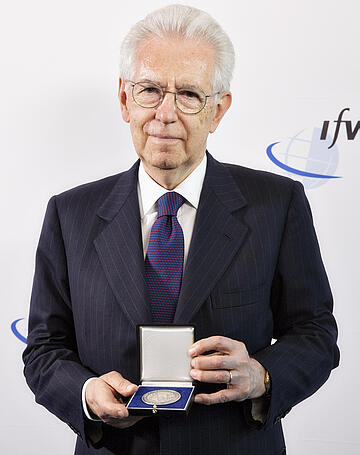Global Economy Prize Laureate 2016
Mario Monti

Mario Monti, born March 19, 1943, in Varese, Lombardy, is an Italian politician and professor of economics, who has held important offices at the national and EU level. He is particularly well known for his combative and uncompromising stance as European Commissioner for Competition against the antitrust activities of large corporations. His success in this role earned him the nickname “Super Mario.” In 2011, he succeeded Silvio Berlusconi as Prime Minister of Italy and laid the foundations for a number of national reforms. Monti has a reputation as a committed European and important supporter of the single currency.
The son of a banker, Monti studied economics at the Bocconi University in Milan before pursuing post-graduate studies at Yale University under James Tobin, inventor of the “Tobin tax” on financial transactions. At the age of 27, he became professor of economics at the University of Turin. Together with Michael A. Klein, he created the “Monti Klein” model, which describes the behavior of banks under monopoly conditions.
In 1994, Monti went to Brussels as European Commissioner for Internal Market, Services, Customs and Taxation, having been nominated by the center-right government of Silvio Berlusconi. In 1999, supported by the center-left government of Massimo D’Alema, he became European Commissioner for Competition. In this post, Monti achieved a number of high-profile victories against powerful global corporations. Microsoft, for example, was forced to disclose information on its Windows operating system to allow competition from rival plug-in vendors. He also blocked the merger of General Electric with competitor Honeywell.
In November 2011, the Italian President, Giorgio Napolitano, appointed Monti a lifetime senator and, following Berlusconi’s resignation as Prime Minister, invited him to form a transitional government with a technocratic cabinet composed entirely of unelected professionals. Later that month, Monti was sworn in as Prime Minister of Italy. He also held the post of Minister of Economy and Finances until July 2012. In the post-Berlusconi era, Monti was seen by many as a beacon of new hope for Italy. His transitional government introduced austerity measures targeted at the labor market, pensions, and taxation. Monti himself renounced his salary as Prime Minister and largely used public transport for official travel.
In December 2012, Monti resigned as Prime Minister after losing support in Parliament. Today, he has returned to his role as President of the privately run Bocconi University in Milan, his alma mater. Mario Monti is married and has two children.